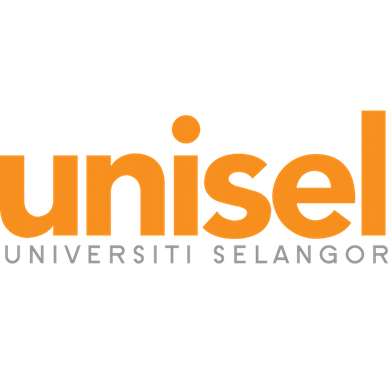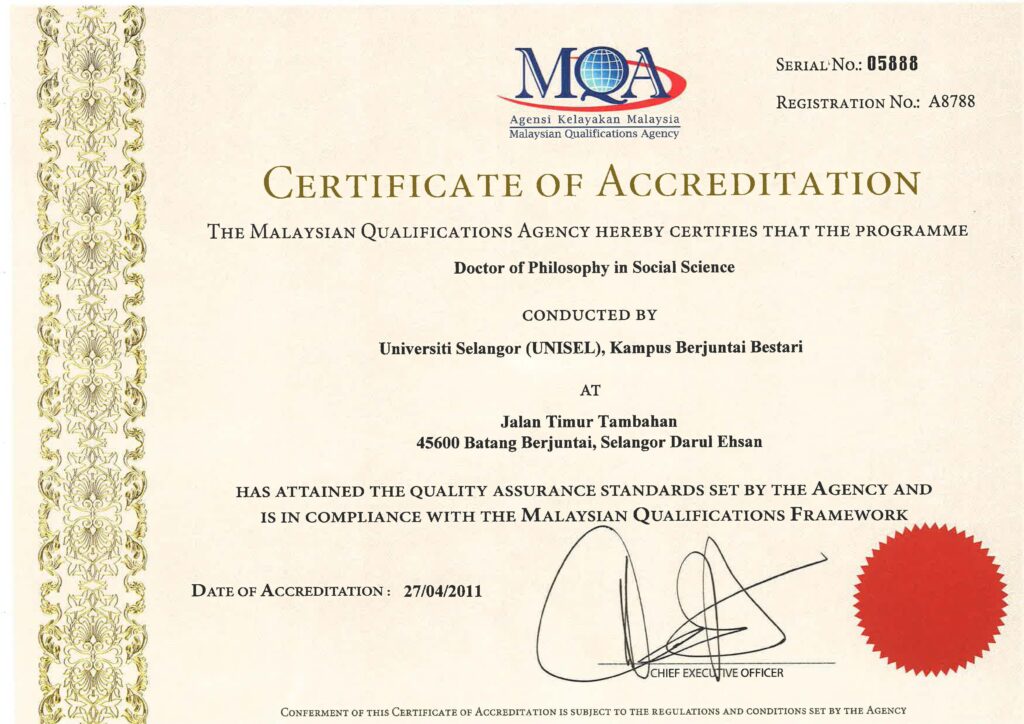Synopsis
Doctor of Philosophy in Social Sciences (MQA Certificate: 05888): This research programme in the field of social sciences and behaviour has a duration of 3 – 8 years of study. Candidates
will show a critical understanding of the most advanced knowledge within the boundaries of the field of study or professional practice. It independently conducts, manages, and leads advanced research that contributes to large, new, and original, and professional knowledge and practices. It produces research results in the form of theses, patents, products, advanced professional practices or advanced technologies, creative models or works of art, or music. Furthermore, it also demonstrates the ability to present and defend points of view, theses, and ideas in the field of expertise with knowledge and confidence. Candidates can become consultants, researchers, and planners in social management. This program also requires the writing of a thesis as prescribed by MQA.
Doctor of Philosophy in Social Science
(R2/312/8/0005)(09/25)(A8788)
Career Prospects
The graduates of the programme are expected to fulfil the market needs at the academic
institutions or research institutions, especially in the social sciences related sectors. This is in line with the nation’s economic transformation programmes of becoming a high-income nation. Some candidates become consultants, researchers, and planners in social management. The candidates will be able to obtain employment in the following capacity as an Academia, a Research, and Development, and a Higher Educational Institutions Staff.
Duration of Study
Full Time: 2 years
Part Time: 4 years.
Classes are during the weekend and school holidays, as most students are expected from the working population.
Entry Requirement
A Master’s Degree, as accepted by the HEP’s Senate; OR other qualifications equivalent to a Master’s Degree, as accepted by the HEP Senate.
English Language Requirement
International students are required to achieve a minimum score of IELTS 5.0 OR it’s equivalent.
Learning Outcomes
At the end of this programme, students should be able to:
Apply the research knowledge and skills learned to various tasks and situations.
Demonstrate a comprehensive-knowledge of the field of study and be informed of the latest developments and trends.
Integrate core knowledge in the planning, preparation, and implementation of research results.
Plan effective research strategies to increase potential for revenue enhancement to build
solid foundation for future growths.
Demonstrate innovative and productive management skills in handling responsibilities,
problems, and tasks.
Display capabilities as a researcher with the ability in academic writing, practical and verbal and non-verbal communication skills.
Perform tasks as an individual, a team member and a member of education institutions in the plural society effectively.
Practice life-long learning to face global challenges.
Apply professional and ethical values in the daily undertaking of tasks and responsibilities.
Study Field
The field of this study is social sciences and behaviour.
Admission Application
Applications for admission should be accompanied by a brief research proposal containing the title, subfield, and research questions.
Tuition Fees
Local — Total RM16, 000
International — Total RM26, 400
Lecturer / Supervisor
The faculty and supervisor of the dissertation for the programme consist of qualified lecturers in related fields at the Masters and Doctoral degrees. A total of 12 of them graduated with a doctorate. Two lecturers hold professors, four Associate Professors, while the other is Senior Lecturers in the field either locally or overseas.
Programme Study Plan
Appendix A (Full-time long semester intake), and
Appendix B (Part-time long semester intake).
Full-Time Study Scheme (3 YEARS)
Semester 1 (FIRST YEAR)
Completion of the prescribed course: Research Methodology
Progress report
Semester 2 (FIRST YEAR)
Colloquium / seminar / workshop
Progress report
Semester 3 (2nd YEAR)
Proposal defence
Research data collection
Progress report
Semester 4 (2nd YEAR)
Processing research data
Writing a research report/dissertation
Progress report
Semester 5 (THIRD YEAR)
Research presentation
Progress report
Semester 6 (THIRD YEAR)
Viva voce
Part-Time Study Scheme (4 YEARS)
Semester 1 (FIRST YEAR)
Completion of the prescribed course: Research Methodology
Progress report
Semester 2 (FIRST YEAR)
Colloquium / seminar / workshop
Progress report
Semester 3 (2nd YEAR)
Proposal defence
Research data collection
Progress report
Semester 4 (2nd YEAR)
Processing research data
Writing a research report/dissertation
Progress report
Semester 5 (THIRD YEAR)
Processing research data
Writing a research report/dissertation
Progress report
Semester 6 (THIRD YEAR)
Processing research data
Writing a research report/dissertation
Progress report
Semester 7 (FOURTH YEAR)
Research presentation
Progress report
Semester 8 (FOURTH YEAR)
Viva voce
Deputy Dean (Research & Academician)
Name: Syed Lamsah bin Syed Chear
Email: syedlamsah@unisel.edu.my
Contact: 018 – 4684247
Programme Coordinator
Name: Dr. Abu Bakar Mohd Sheikh,
E-mail: abu_sheik@unisel.edu.my
Contact: 017-2023798

PROGRAMME STRUCTURE (BY RESEARCH)
| Description | Course Code |
|---|---|
| Semester 1 | ESP7111 |
| Research Methodology | CMP7000 |
| Semester 2 | ESP7121 |
| Proposal Defence | CPP7000 |
| Semester 3 | ESP7131 |
| Semester 4 | ESP7141 |
| Semester 5 | ESP7151 |
| Candidature Defence | CCD7000 |
| Semester 6 | ESP7161 |
| Viva Voce | ESP7331 |
| Viva Voce Correction | ESP7000 |


